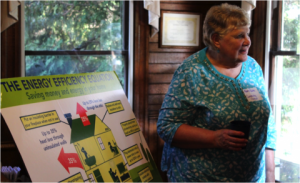Editor’s note: This post by Michael Goldberg originally appeared on the website of We Own It, a national network to help electric cooperative members rediscover their role as owners of a democratically-controlled enterprise. The piece focused on the efforts of Appalachian Voices’ Energy Savings for the High Country campaign.
How members of Blue Ridge Electric got their co-op’s attention, and action, on energy efficiency.

Mary Ruble speaks at an Appalachian Voices event to present more than 1,000 signatures from Blue Ridge Electric members supporting access to “on-bill” financing
“Oh, I don’t think we can do that.”
Mary Ruble says that was the initial response from her electric co-op — Blue Ridge Electric in western North Carolina — to the idea of an “on-bill financing” program to help more members afford home improvements that reduce electricity use and lower bills.
A year later now, Blue Ridge has launched just such a program, called the Energy SAVER loan program. As an on-bill financing program, it aims to better serve co-op members who don’t have the up-front money for weatherization and other efficiency upgrades for their homes, especially those who may not be able to get a traditional bank loan. Members who qualify for the program get a loan for upgrades such as better insulation, air and duct sealing, and improved HVAC systems – with no upfront costs – and then repay over time through a charge on their utility bill. The goal is that the electricity savings generated through the improvements will be greater than the annual repayment, so that there’s a net savings for members.
So how was Blue Ridge convinced?
“Blue Ridge kept telling us they needed to hear from the members,” explains Ruble, a retired librarian and Blue Ridge Electric co-op member in Boone, North Carolina. “So we got over 1,000 signatures from co-op members on a petition. We got publicity. We went to board meetings. We made sure they heard from members.”
A lot of effort, but rewarding
Ruble is careful to explain that convincing the executives at her co-op took a lot of work. Members of other electric co-ops may find that the challenges she describes sound familiar: “In the old days our electric co-op used to have big meetings with festivities and music, and food and door prizes,” Ruble says. “Now voting is by proxy. The board meetings are in the middle of the week in the middle of the day, so they’re hard for people to attend. You get three minutes to speak. It can feel intimidating. It can feel like they don’t really want people there.”
Another challenge is that many people don’t think much about electricity. Ruble says that showing the cost of wasted electricity gets people’s attention. “You have to pull people in based on their interests,” Ruble says. “We had a graphic of a house with very few words, just showing the loss of energy – dollars flowing out the window. That gets people’s attention. I went to that first workshop myself to see how I could save.”
In addition to workshops, staff and volunteers with Appalachian Voices talked with co-op members and gathered over 1,000 signatures from members in support of an energy efficiency loan program with on-bill financing. Appalachian Voices also organized a “Home Energy Makeover Contest,” which awarded free home energy upgrades to several residents, as well as public events to raise awareness.
The Blue Ridge program is similar to a no-debt investment program called Upgrade to $ave offered by another NC cooperative, Roanoke Electric Cooperative, which provides on-bill financing through an opt-in tariff rather than a loan. While both of these approaches are opening the doors of opportunity for members, the tariffed terms allow renters to also benefit from a utility’s cost effective investments in energy upgrades. For more information on no-debt energy efficiency, see “How Electric Co-ops Can Save Money for their Members.”
Ruble says that at first she wasn’t sure how she could best help on the effort, but realized that as a retiree she had time to spare to help with tabling at grocery stores and local fairs, and had local connections and contacts she could call on. “It’s inspiring to be involved,” she reflects. “We didn’t get everything we wanted, like extending the program to renters, which is really needed but Blue Ridge hasn’t done so far. But it’s a start. We made progress, and we can make more going forward. An electric co-op is still member-owned,” Ruble adds. “You just have to be tenacious, and stay nice.”



Leave a Reply